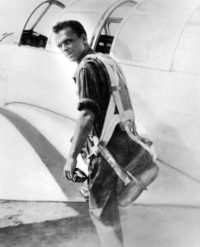 The remains of U.S. Army Air Forces 2nd Lt. William J. McGowan, 23, of Benson, Minnesota, have been identified 75 years after he was killed on June 6th, 1944, during the Allied invasion of Normandy. He flew a P-47 Thunderbolt for the 391st Fighter Squadron, 366th Fighter Group, 9th U.S. Air Force.
The remains of U.S. Army Air Forces 2nd Lt. William J. McGowan, 23, of Benson, Minnesota, have been identified 75 years after he was killed on June 6th, 1944, during the Allied invasion of Normandy. He flew a P-47 Thunderbolt for the 391st Fighter Squadron, 366th Fighter Group, 9th U.S. Air Force.
McGowan was on a sweep and strafing mission near the city of Saint-Lô when his Thunderbolt was hit by anti-aircraft fire. The plane spun at low altitude, crashing into a field and exploding on impact. Witnesses reported to American Graves Registration Service investigators in 1947 that the crash had been a terrible one. The plane was deeply embedded into the ground and burst into flames so intense that the wreck burned for more than a day. Some of the wreckage from the plane was retrieved during that investigation, but no human remains were found. McGowan’s remains were declared unrecoverable on December 23rd, 1947.
A new investigation was undertaken by the Joint POW/MIA Accounting Agency (DPAA) in 2010. A team surveyed the crash site near the village of Moon-sur-Elle, re-interviewed witnesses and determined that there was more to be found. They recommended further excavation. The excavation took a few years to come to fruition, but in the summer of 2018, a St. Mary’s University Forensic Aviation Archaeological Field School team excavated the wreck site and did indeed recover potential human remains.
They were sent to a DPAA laboratory for testing in the hope they could be identified as those of Lt. McGowan. Thanks to dental records, anthropological analysis and substantiating circumstantial and material evidence, the Defense POW/MIA Accounting Agency announced last Wednesday that they had been able to positively identify the remains.
McGowan will be buried July 26 at the Normandy American Cemetery in France. […]
McGowan’s name is recorded on the Tablets of the Missing at the Normandy American Cemetery, an American Battle Monuments Commission site in Colleville-sur-Mer, France.
A rosette will be placed next to his name to indicate he has been accounted for.